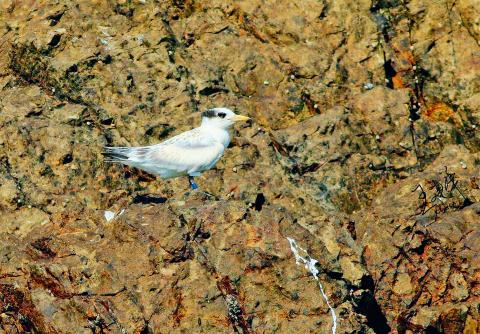A Taiwanese research team banded a juvenile Chinese crested tern (Thalasseus bernsteini) in July, hoping to track its migration and learn more about the “mythical” bird that roosts in three groups of islands off the southeastern coast of China from May to August, a Forestry Bureau official said.
It was the first-ever successful banding of a Chinese crested tern, Forestry Bureau conservation official Hsia Jung-sheng (夏榮生) said.
The rare species nests in Taiwan’s Matsu (馬祖), as well as Jiushan and Wuzhishan islands off China’s Zhejiang Province from May to August and locals consider it a summer migratory bird.

Photo: Courtesy of the Forestry Bureau
The population of the bird was estimated at less than 50 in the International Union for Conservation of Nature Red List in 2000 and it is categorized as critically endangered, Hsia said.
Nature photographer Liang Chieh-te (梁皆得) happened to photograph the Chinese crested terns in Matsu while filming his documentary Fly, Kite Fly (老鷹想飛) in 2000.
To conserve the species, the Forestry Bureau and the Lienchiang County Government commissioned a research team led by National Taiwan University School of Forestry and Resource Conservation professor Yuan Hsiao-wei (袁孝維) and the Wild Bird Society of Taipei to conduct studies to understand the birds’ behavior.
Taiwanese and Chinese research teams recorded 99 Chinese crested terns in the three island groups from May to August, a record high for the rare bird, Hsia said.
The researchers banded the juvenile in mid-July, saw it again in early August and estimated that it had left the islands in late August, Hsia said.

Alain Robert, known as the "French Spider-Man," praised Alex Honnold as exceptionally well-prepared after the US climber completed a free solo ascent of Taipei 101 yesterday. Robert said Honnold's ascent of the 508m-tall skyscraper in just more than one-and-a-half hours without using safety ropes or equipment was a remarkable achievement. "This is my life," he said in an interview conducted in French, adding that he liked the feeling of being "on the edge of danger." The 63-year-old Frenchman climbed Taipei 101 using ropes in December 2004, taking about four hours to reach the top. On a one-to-10 scale of difficulty, Robert said Taipei 101

Nipah virus infection is to be officially listed as a category 5 notifiable infectious disease in Taiwan in March, while clinical treatment guidelines are being formulated, the Centers for Disease Control (CDC) said yesterday. With Nipah infections being reported in other countries and considering its relatively high fatality rate, the centers on Jan. 16 announced that it would be listed as a notifiable infectious disease to bolster the nation’s systematic early warning system and increase public awareness, the CDC said. Bangladesh reported four fatal cases last year in separate districts, with three linked to raw date palm sap consumption, CDC Epidemic Intelligence

US climber Alex Honnold left Taiwan this morning a day after completing a free-solo ascent of Taipei 101, a feat that drew cheers from onlookers and gained widespread international attention. Honnold yesterday scaled the 101-story skyscraper without a rope or safety harness. The climb — the highest urban free-solo ascent ever attempted — took just more than 90 minutes and was streamed live on Netflix. It was covered by major international news outlets including CNN, the New York Times, the Guardian and the Wall Street Journal. As Honnold prepared to leave Taiwan today, he attracted a crowd when he and his wife, Sanni,

Two Taiwanese prosecutors were questioned by Chinese security personnel at their hotel during a trip to China’s Henan Province this month, the Mainland Affairs Council (MAC) said yesterday. The officers had personal information on the prosecutors, including “when they were assigned to their posts, their work locations and job titles,” MAC Deputy Minister and spokesman Liang Wen-chieh (梁文傑) said. On top of asking about their agencies and positions, the officers also questioned the prosecutors about the Cross-Strait Joint Crime-Fighting and Judicial Mutual Assistance Agreement, a pact that serves as the framework for Taiwan-China cooperation on combating crime and providing judicial assistance, Liang